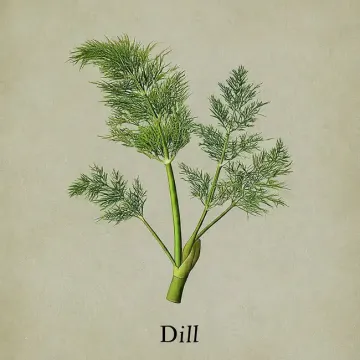Dill (Anethum graveolens) is a versatile herb that has been cherished for centuries for its aromatic foliage, flavorful seeds, and medicinal properties. Known for its feathery green leaves and yellow flowers, dill is a staple in many culinary traditions around the world. This herb is easy to grow in the home garden and can be used fresh or dried, making it a valuable addition to any gardener's herb collection.
History of Dill
Dill has a rich history that dates back thousands of years. It is believed to have originated in the Mediterranean region and was widely used by ancient Egyptians, Greeks, and Romans. The Egyptians used dill in medicine, while the Greeks and Romans used it both as a culinary herb and in their religious rituals. Dill was also highly regarded in medieval Europe, where it was believed to possess protective qualities, often hung in doorways to ward off evil spirits.
Health Benefits of Dill
Dill is not just a culinary delight; it also offers a range of health benefits. Some of the most notable include:
- Digestive Aid: Dill has been traditionally used to alleviate digestive issues such as bloating, gas, and indigestion. The essential oils in dill can stimulate the production of digestive juices, helping to improve digestion.
- Anti-inflammatory Properties: Dill contains compounds with anti-inflammatory properties, making it useful in reducing inflammation in the body.
- Bone Health: Dill is a good source of calcium, which is essential for maintaining strong bones and preventing bone-related disorders.
- Antioxidant Properties: The herb is rich in antioxidants, which help protect the body from damage caused by free radicals, potentially reducing the risk of chronic diseases.
Culinary Uses of Dill
Dill is a versatile herb that can be used in a variety of dishes, both fresh and dried. Some popular culinary uses include:
- Pickling: Dill is famously used in the pickling process, particularly in dill pickles. The seeds and leaves impart a distinctive flavor to the brine.
- Salads: Fresh dill leaves add a bright, fresh flavor to salads, especially cucumber and potato salads.
- Sauces and Dips: Dill is often used in creamy sauces, such as tzatziki and dill sauce, which pair well with fish, vegetables, and grilled meats.
- Breads: Dill seeds can be added to bread dough to give a unique flavor to homemade bread.
Growing Tips for Dill
Dill is a relatively easy herb to grow, making it an excellent choice for both beginner and experienced gardeners. Here are some tips to help you cultivate dill successfully:
- Location: Dill thrives in full sun and well-drained soil. Choose a location in your garden that receives at least 6-8 hours of sunlight daily.
- Soil: Dill prefers slightly acidic to neutral soil (pH 5.5-7.0) that is rich in organic matter. You can improve your soil by adding compost or well-rotted manure before planting.
- Planting: Dill can be planted directly in the garden after the last frost. Sow the seeds about 1/4 inch deep and space them 12-18 inches apart. Thin the seedlings to 6-12 inches apart once they are established.
- Watering: Dill needs regular watering, especially during dry spells. Keep the soil consistently moist but not waterlogged.
- Maintenance: Dill is a low-maintenance herb. However, it can become tall and leggy, so it may need staking or support. Additionally, dill can reseed itself if allowed to flower, so you may want to deadhead the flowers if you don't want it to spread.
- Harvesting: You can start harvesting dill leaves as soon as the plant has at least 4-5 leaves. For dill seeds, wait until the flower heads have dried and turned brown. Cut the heads and hang them upside down in a paper bag to collect the seeds.
Conclusion
Dill is a wonderful addition to any home garden, offering both culinary and health benefits. With its rich history, ease of cultivation, and versatility in the kitchen, growing dill allows you to enjoy a fresh supply of this aromatic herb throughout the gardening season. Whether you use it in salads, pickles, or sauces, dill's unique flavor will surely enhance your culinary creations.

